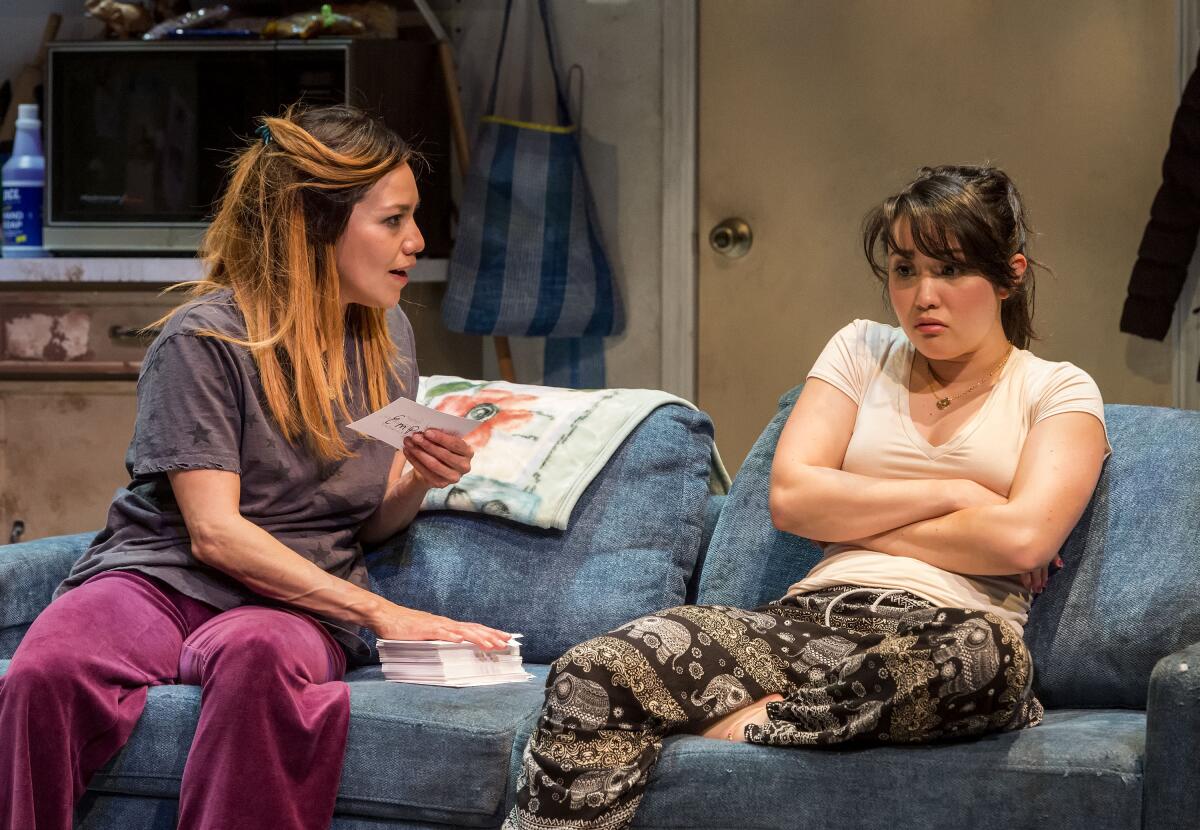Commentary: In ‘Alma’ and ‘Apartment Living,’ kitchen-sink realism returns to the theater L.A.-style

- Share via
Kitchen-sink drama, the genre that brought social realism to the stage in a clatter of dirty dishes, is widely dismissed as a mid-20th century relic.
What began as a revolution in the hands of such playwrights as Clifford Odets, John Osborne and Arnold Wesker to move the theater out of posh drawing rooms and into working-class tenements devolved into the kind of trite family drama that was too busy making an elaborate meal of leftover psychology to worry about politics or economics. Two recent world premieres, however, breathe life into the old tradition by reconnecting drama to the social conditions of its characters.
Boni B. Alvarez’s “Apartment Living” at Skylight Theatre (through April 24) and Benjamin Benne’s “Alma” at the Kirk Douglas Theatre (through April 3) invite us into the cramped homes of ordinary Angelenos, some with decent jobs, others struggling to get by. Black, Mexican American and Filipino American, they are fighting against the odds for a sliver of the American dream.
These characters have little in common with the vision of Southern California promulgated on so-called “reality TV.” It’s a peculiar fact of modern life that the Kardashian mansions occupy so much space in the popular imagination versus the realities that many Angelenos live, but the stage affords an opportunity to correct the record.
“Apartment Living,” a co-production between Playwrights’ Arena and Skylight Theatre Co., revolves around two sets of neighbors in a small Los Feliz apartment complex. The play begins just as the COVID-19 pandemic is sweeping over the local community. These two households, familiar strangers to one another, exist in parallel universes that unexpectedly intersect.
“Alma” takes place in a small one-bedroom in La Puente in the period after Donald Trump won the 2016 presidential election but before he was inaugurated. Alma, an undocumented mother from Mexico, and Angel, her 17-year-old American-born daughter, are the occupants of this apartment, which is both a pressure cooker of domestic tensions and a sanctuary from an increasingly rancorous political environment.
Privacy is a luxury that the characters in these dramas cannot afford. Perhaps this is why secrets abound in both “Apartment Living” and “Alma.” Life is too messy for total transparency.
In “Apartment Living,” Cassandra (Charrell Mack) and Alex (Gabriel Leyva) are making the final preparations for their wedding when the pandemic hits. Alex, an actor, loses his restaurant gig just as Cassandra, a business manager, is forced to work from home.
The claustrophobia will be familiar to anyone who has shared a living space that has suddenly become a schoolroom and a home office. As resentments build between Cassandra and Alex, the economic seams of their relationship begin to show.
In one scene, Alex is venting his fury at the automated phone system standing in the way of his unemployment benefits just as Cassandra is demanding that he make a decision on whether to postpone their wedding because of COVID-19. The two fall out of sync, financially and sexually, with the couch serving as a second bedroom.
The pandemic doesn’t so much cause as exacerbate existing problems between them. But the impossible cost of housing in Los Angeles can influence the path of a couple’s future every bit as much as love.
Meanwhile, next door, Easter (Gigette Reyes), a nurse, wants her son, Dixon (Andrew Russel), a grocery store clerk, to take more seriously the virus that is suddenly flooding her hospital with patients. His attitude is cavalier, until his mother ends up in the ICU.
Alvarez connects these two apartments in a way that throws into relief the murkiness of identity. Alex and Dixon turn out to know each other. Whether you find their connection shocking will depend on how willing you are to accept that the person closest to you may not be who you think he is.
The chain of relationships in “Apartment Living” suggests not only that an intimate partner, a relative or close friend could be wearing a mask but that a stranger at the grocery store — in this case, a random white lady (played by Rachel Sorsa) — or neighbor you barely speak to might see you more clearly and compassionately than a loved one.
The production, directed by Jon Lawrence Rivera, employs an unnecessarily cumbersome scenic design. Alex Calle’s sets are heaved into position by the actors, a Sisyphean task that isn’t worth the muscle for apartments that are only generically outlined. Why not keep the staging fleet and abstract? This is realism with all the ponderous weight but little of the visual payoff.
The play’s structure is elegant, though it’s not clear how well Alvarez knows his characters. The actors are tasked with filling in incomplete sketches, and occasionally they appear lost.
Yet “Apartment Living” gives a textured sense of what the last two years cooped up in our homes have been like. In Jean-Paul Sartre’s “No Exit,” hell is defined as other people with whom we are inescapably trapped. In “Apartment Living,” heaven can be a chance encounter with someone we may never speak to again.

Benne describes “Alma” as “a poetic realism play about the American dream,” but realism outweighs poetry here. This is a conventionally structured drama: two characters, a single set, the requisite amount of family conflict, a few ferreted out secrets and a dark shadow of menacing politics.
What distinguishes the writing is its cultural specificity. A world is constructed onstage that the actors, Cheryl Umaña and Sabrina Fest, inhabit as if they’ve been living there most of their lives. (Tanya Orellana’s scenic design gets every detail right.)
Alma, who works late into the night, sleeps on the couch uncomplainingly so that her daughter can have the bedroom. Angel, a typical high schooler, wants more space for herself. She resents that her room has a curtain instead of a door. And she doesn’t want to explain why she keeps forgetting the rice and beans her mother lovingly prepares for her school lunch or why she’s not at home when she’s supposed to be studying for the S.A.T.
The tropes are familiar, but there’s a vividness to the theatrical expression. Exasperated with her daughter’s defiance, Alma rushes to get the dreaded “chancla,” a flip-flop sandal used to spankingly remind her daughter who’s boss. The punishment, however, seems to hurt Alma more than Angel, who immediately becomes her mother’s comforter.
The intimacy between them — the way they snuggle under the blanket from different ends of the couch, the peace that comes over them when their favorite wildlife show is on TV — is movingly rendered. Under the sensitive direction of Juliette Carrillo, Umaña’s Alma and Fest’s Angel unearth the lyricism in the routine squabbles of a mother and daughter, who are navigating their way through a land of opportunity that is also a land of systemic inequality.
There’s a tentativeness to the way Benne, who’s still a playwriting student at what was formerly known as the Yale School of Drama, lifts off from this ground of realism. A television set with a mind of its own becomes the mechanism through which the toxic rhetoric of the dawning Donald Trump era permeates even the dreaming that takes place in this apartment.
Realistic plays don’t need an excuse pass to fly into other stylistic modes. The stage is inherently a poetic space. But “Alma” represents a new direction for Center Theatre Group, which under the influence of associate artistic director Luis Alfaro is committed to reflecting contemporary Los Angeles in all glorious diversity on the company’s three stages.
Alfaro articulated CTG’s vision in an interview last year: “We don’t need to find the Pulitzer Prize-winning playwright of this year. We need to find the one who is five plays away from that Pulitzer.”
Champions of the overlooked and chroniclers of how we live now, Alvarez and Benne are strong bets for a healthy playwriting future.
'Apartment Living'
Where: Skylight Theatre, 1816 ½ North Vermont, L.A.
When: 8:30 p.m. Saturdays, 3 p.m. Sundays, 7:30 p.m. Mondays. (Check for exceptions.) Ends April 24
Tickets: $20 - $42
Contact: www.skylighttheatre.org
Running time: 1 hour, 30 minutes
'Alma'
Where: Kirk Douglas Theatre, 9820 Washington Blvd, Culver City, CA 90232
When: 8 p.m. Tuesdays-Fridays, 2 and 8 p.m. Saturday and 1 and 6:30 p.m. Sundays. Ends April 3
Tickets: $30-75 (subject to change)
Contact: (213) 628-2772 or centertheatregroup.org
Running time: 1 hour, 16 minutes (no intermission)
More to Read
The biggest entertainment stories
Get our big stories about Hollywood, film, television, music, arts, culture and more right in your inbox as soon as they publish.
You may occasionally receive promotional content from the Los Angeles Times.











